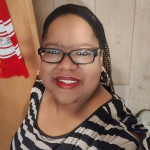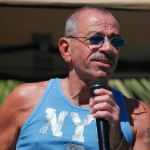Atlanta, Georgia
Positive since 1990
For nearly a year between 1990 and 1991, I was madly in love with someone who was not ready to be in a relationship. He was a 21-year-old kid from Denver starting his new gay life in San Francisco. For nearly a year I went without sex—as in, no sexual contact whatsoever. It didn’t bother me because the love I felt for him was all that mattered.
Then one night, this adorable redhead would not leave me alone. He insisted that I was going to come home with him, and he wouldn’t take no for an answer. So I went to his place and explained that there was no way I was going to do anything unsafe. He agreed.
We got naked together and watched porn. There was no fluid exchange and certainly no penetration. But when put on my pants in the morning, I felt a sharp pain on the ridge under my penis. I didn’t think much about it, but I did notice a pin-sized piece of skin was missing. I assumed it was from his braces, but I wasn’t concerned.
That day, I walked to the beach and passed out only to wake up hours later with my backside frozen solid and blisters all over my exposed skin from the sunburn. I managed to get home and figured I had thrown my back out, because my entire body ached. Two days later I called a chiropractor, who agreed to make a house call. When he arrived and touched me, he pulled his hands back and called an ambulance.
For nearly two days I was bathed in ice at the hospital as they tried to manage my 103-degree temperature. They gave me a western blot test and assured me that I wasn’t HIV positive. They gave me a strong antibiotic and sent me home.
About a week later, I went back to the hospital with thrush so bad I couldn’t swallow. I had a rash over most of my body and one eye had swollen shut. They had no idea what the problem was, so they sent me home with more antibiotics, again promising me it couldn’t be HIV.
But I just got worse and worse. My job knew better than to fire me, so they made me a contract employee and then canceled my contract. I sat on the couch waiting to die. That’s when I got a call from University of California, Davis. They told me that they wanted me to come in for some blood tests. They thought that I might have what was called “primary HIV,” and I assured them I didn’t.
I explained that I hadn’t had sex in a year and the other doctors told me it wasn’t HIV. That’s when the doctor offered to pay for a new test called the p24 antigen test. It isolates proteins in the blood that can only exist if you have been exposed to the virus. They knew of eight proteins and thought that the immune system would fight the virus and knock it back. The virus would mutate and a new protein would appear. After about nine mutations, the immune system would think it won, and it would start producing the ineffective HIV antibody the doctors tested for.
They explained that this process was called seroconversion and it was nearly impossible to study, because usually a person gets some flu-like symptoms that go away. Seroconversion can take six to nine months after initial exposure, so by the time they catch it, it’s already been in the body for a while. At UC Davis they were excited to find me and were even more excited when, sure enough, I had five of the eight proteins.
The problem was that it looked like my immune system was going to fail because I had been on antibiotics, which had all but suspended my immune system’s normal antiviral activity. They gave me three months to live.
At 21, I went from having an amazing life, with a house on Castro Street near Market Street, an amazing job, the love of my life and everything you could ever want, to losing everything and looking death in the eye. It was a different kind of despair than I could ever describe. I was unable to swallow because the thrush nearly closed off my throat. I had shingles in my eye and covering a significant portion of my neck, side, and butt.
I sat in front of the television waiting for death.
But something amazing happened. A lesbian friend who played pinball with me at a bar called the Detour showed up and let herself in. She sat down next to me, close enough that we were almost touching. I was so terrified for her. I couldn’t stop her, but I didn’t want her to get infected. I had open sores all over.
That’s when she told me that I didn’t have a choice. She was going to drag my carcass to the Detour and prop me up in the corner, because I was just feeling sorry for myself, and if I was gonna die, it was gonna be on her terms. She told me that if a single person even looked at me wrong, she would personally kick them out of the bar. So, for the first time in over a month, I got off the couch and left the apartment.
When someone whispered, “Look, that guy has AIDS. He should be in a hospital,” I’ll be damned if she didn’t grab him by the neck and physically toss him out the front door. She saved my life.
When the marshal came to evict me two days later, I had no possessions and nowhere to go. My friend took me in and fed me and talked to the doctors for me. Before long, I was under the care of the Veterans Medical Center in Palo Alto, where two doctors took 18 vials of blood every day for two weeks, then every other day for months.
I would not be alive today had it not been for the grace of Dr. Larry Mole and Dr. Mark Hilodniy. They gave me a reason to live and they paid me for being part of the first-ever study on primary HIV and its effects on the body.
I still lived every day for the next several years thinking I would be dead any minute. The decisions you make when you have no future are so much different than those you make when you don’t know. I wish I could say that it was somehow enabling, or that I championed the cause of others infected with HIV. But to be honest, I spent every day thinking I would die.
I was convinced that I was unlovable, a diseased pariah, and the thought of ever loving someone or being loved was laughable. I figured that if AIDS didn’t kill me, my shriveled up heart would.
But, as fate would have it, on February 20, 1994, I met two guys who changed my life forever. One worked for Apple, and the other went to San Francisco State University. They were best friends and we immediately got along, so much so that they took me back to their house in Palo Alto, and I spent the next year with them.
It was a terrible way to start but I was falling head over heels for one of them and our relationship was touch-and-go for a while. I was homeless, jobless, sick and scared. But there was something between us that couldn’t be described.
I am still with that man today. He has been with me through unbelievable circumstances, and I love him more than anything in the world. We have had our share of problems throughout the last 20 years, but there has never been a single moment that I have not loved him dearly.
I am currently undetectable and my counts are great. I am in excellent health and I am blessed to have him in my life.
The reason I wanted to share my story is that even with all the love that I have in my life and all the miraculous support that I have had, the biggest issue that I still face, every day, is the terrible and debilitating fear that I won’t be alive tomorrow. I have come a long way, and I struggle with it less and less. However, just because I am living and healthy today, and just because I have love and success in my life, that doesn’t mean that I don’t struggle every day with the fear that I will die tomorrow, and the guilt that I have wasted so many years paralyzed by that fear.
I am not the only long-term survivor of HIV to find themselves at 45 years old looking back at the choices I have made, and wondering what I could have done if I had only known. How would my life be different if I hadn’t lived every day as though it was the last?
There needs to be a concerted effort to recognize this struggle for people who never expected to live this long because they were infected in the ’80s or ’90s. I most likely have another 45 years to live and it is work every day to remember that. Don’t judge me or anyone else who has been positive for 20 years or longer without considering that none of us expected to be alive more than a year or two.
What three adjectives best describe you?
Passionate, creative, resourceful.
What is your greatest achievement?
To have learned how to give and to receive love, genuine love
What is your greatest regret?
I regret more than anything that I infected the person I love.
What keeps you up at night?
Crystal meth
If you could change one thing about living with HIV, what would it be?
I would eliminate my obsession with death and my constant fear of getting sick or dying.
What is the best advice you ever received?
Love is everything.
What person in the HIV/AIDS community do you most admire?
Nelson Vergel
What drives you to do what you do?
If I knew that, I would bottle it and sell it.
What is your motto?
Though the early bird gets the worm, it’s the second mouse that gets the cheese.
If you had to evacuate your house immediately, what is the one thing you would grab on the way out?
My dog, Peanut
If you could be any animal, what would you be? And why?
Human—top of the food chain, baby!






Comments
Comments